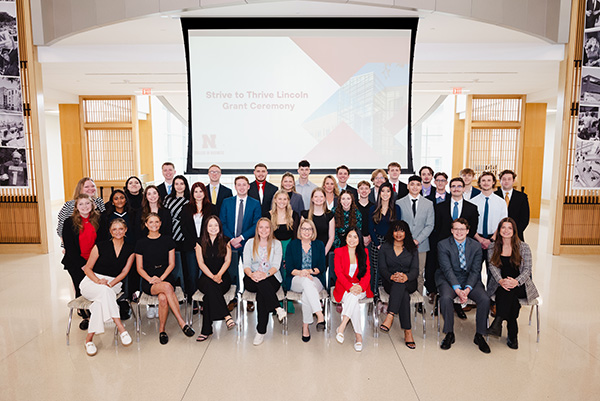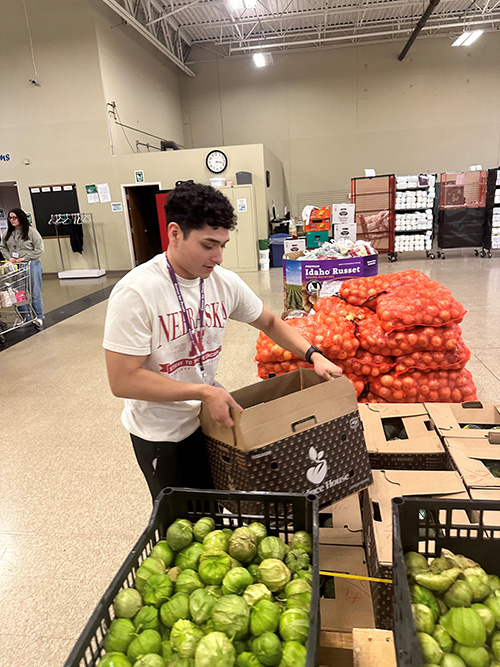Students in the Philanthropy and Leadership (MNGT 411) course at the University of Nebraska–Lincoln College of Business discover how nonprofits empower communities and philanthropy can foster positive change. Their hands-on project called Strive to Thrive Lincoln culminated in two local nonprofits — Camp Kesem and Mourning Hope Grief Center — receiving a total of $10,000 in grants in May.
 Students in Philanthropy and Leadership course hosted a grant ceremony to award $10,000 to local nonprofits on May 1.
Students in Philanthropy and Leadership course hosted a grant ceremony to award $10,000 to local nonprofits on May 1.
Now in its 15th semester, Strive to Thrive Lincoln enables students to gain firsthand insight into the nonprofit world while leading the grant-awarding process. Students in the class have allocated $150,000 to Lincoln nonprofits since 2015. Funded by notable Lincoln philanthropist Rhonda Seacrest, the course enables students to screen, interview and evaluate local nonprofits to choose their grant recipients.
"These organizations participated in Zoom interviews, hosted us for service projects, and gave us the chance to come in and conduct site visits. It was a remarkable amount of time on their part to help us learn with no guarantee of a grant," said Amber Messersmith, executive director of Center for Executive and Professional Development and lecturer of management. "In fact, none of our 12 grant contenders this semester have ever been selected for a Strive to Thrive Lincoln grant before, but they have been finalists multiple times. It means they have been vetted by multiple classes — some as many as nine times. They all have been committed to this experiential learning opportunity."
The organizations students considered included: Boys and Girls Clubs of Lincoln, Camp Kesem, Center for People, Community Action Partnership of Lancaster and Saunders Counties, Educare Lincoln, Family Service Lincoln, Friendship Home, HopeSpoke, Malone Center, Mourning Hope Grief Center, Northeast Family Center and Teammates Mentoring.
"Instead of eliminating multiple nonprofits partway through the semester to determine our site visit finalists, we considered all 12 from start to finish," she said. "Our due diligence involved students preparing whitepapers, interviewing nonprofit leaders, giving and listening to classmates’ pitches over nonprofits, completing service projects, making site visits, presenting to the class again about their site visit experiences, analyzing Form 990 reports and deliberating multiple days as a class."
 Students volunteered with the 12 organizations as a way to better understand the work they do. Ramon Rodriguez, junior business administration major from Columbus, Nebraska, helped distribute food at the Center for People.
Students volunteered with the 12 organizations as a way to better understand the work they do. Ramon Rodriguez, junior business administration major from Columbus, Nebraska, helped distribute food at the Center for People.
This change made the students' interactions with each organization more in-depth. While serving in various roles in different groups like the evaluation team or communications team, students led the project. In the process, they collaborated across teams for specific activities like site visits and volunteering while getting to know each other better.
"I chose to be a part of the group who volunteered at the Mourning Hope Grief Center. After a tour, we helped them catalog quilts made by community members who make them in memory of someone they loved and lost. My classmates helped put together materials for their group sessions like rocks in bags. Each rock signifies to others where they are in their grief journey," said Madison Tarencz-Rasmusen, a sophomore management and marketing major. "Everyone at some point experiences grief, and it never really ends."
Tarencz-Rasmusen shared with her classmates that her mom passed away from cancer during her freshman year of high school. She said she knew the difference their free grief support services could make in people's lives.
"I feel like having that genuine connection and being able to tell the class I have gone through this impacted our class deliberations. It made them better understand the people they serve," she said. "I grew up in McCook, a small town in Nebraska, and I didn't know that these resources were available to me. I think it would have changed my life."
Her experience with her mom also made her personally relate to the mission of Camp Kesem, which supports children through a parent's cancer with free camp and fun-filled programs. She got the opportunity to interview the student staff of the University of Nebraska's chapter of Camp Kesem for her whitepaper assignment.
"From the beginning, our class immediately understood what they do and the impact they have. We also understood how our grant would significantly impact what they're doing," Tarencz-Rasmusen said. "Based on hearing about my classmates' connection with Camp Kesem, I could see them going back to volunteer with them on their own time."
That spark to get more involved in the community ignited Ethan Forcade, junior management major from Omaha, Nebraska. Chosen by the class to share his Strive to Thrive Lincoln experience during the grant ceremony, the ROTC student said it left a lasting impact on him.
"It didn't take me long to figure out that there was so much more to philanthropy than giving money or donating an hour or two of your time. I've learned that nonprofits provide critical human services and make me think about how to be a better human being by finding ways to think critically about the issues our community faces and how to solve them creatively. It motivates me to give more and keep a mindset of improving the community," he said.
Messersmith added that this Strive to Thrive Lincoln ceremony, hosted on May 1, marked a special day in the Lincoln community.
"Give to Lincoln Day, which starts today, is actually a month-long, community-wide giving event that supports local nonprofits. Every one of the 12 organizations we worked with this semester does meaningful work in our community and is worth your consideration when you engage in your own philanthropic efforts," she said.
Published: May 1, 2024